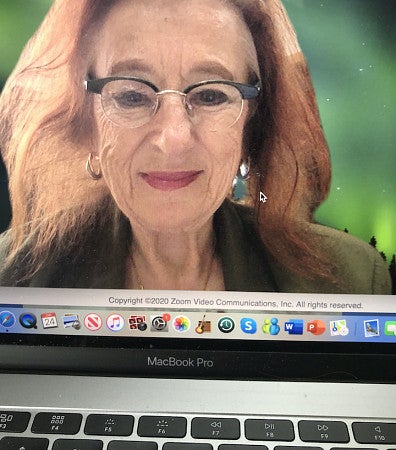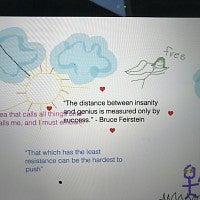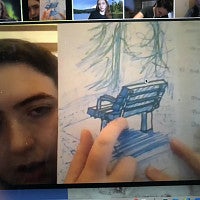Dr. Barbara Mossberg’s "The Genius of Study Abroad" goes online, she wins the COVID-19 Research Innovation Award, and keeps students excited for travel

Story by Jillian Baldwin, CHC Communications
Photos courtesy of Barbara Mossberg
Barbara Mossberg has a tendency to see problems as if they were flamingoes. For the Clark Honors College professor, she relates the incident in Alice in Wonderland: The Red Queen hands Alice a live flamingo instead of a mallet for the epic croquet game. With the wriggling commotion in her arms, Alice finds humor in the situation as she figures out how to get along in an absurd situation. But Mossberg’s problem wasn’t managing her flamingo fate in a game of croquet; it was how to convey the experience of study abroad when the world hands you a global pandemic.
Mossberg’s signature class, “The Genius of Study Abroad” has been known as the epitome of what the CHC defines as an interdisciplinary approach to creativity and global scholarship. Mossberg and her students recreate “the footsteps of genius” in London, Paris, Oxford, and Dublin. However, with the pandemic travel restrictions, the class had to retrace the paths of intellectuals and creatives virtually and “investigate genius in a new environment,” Mossberg said.
How was a study abroad class that relies so heavily on experiencing different and “foreign” physical places to unlock genius when students are under stay-at-home orders? “It was an extraordinary creative challenge and new opportunity,” Mossberg said, and one that she was excited by. With innovation and imagination, her efforts proved not only successful, but also saw her recognized by the Office of the Provost when she was one of 22 University of Oregon professors honored with the COVID-19 Research Innovation Award from the Office of the Provost. The honor was granted in recognition of Mossberg’s timely efforts to deploy research expertise towards understanding COVID-19 and addressing pandemic-related issues for the benefit of our community.
“During an extraordinary time, Dr. Mossberg exemplified innovation in her research by bridging her life experiences and research expertise to focus on the role of poetry in resilience, in the wake of the suffering from the pandemic and as a means to heal personal and civic trauma,” said Yvonne Braun, Associate Vice Provost for Academic Affairs. “She brings this research into her teaching, drawing on research-led pedagogies which integrate the current conditions of quarantine and confinement into a larger historical and global perspective to understand and explore the possibilities of transformational learning and agency that can occur through various experiences of confinement. She is working on an anthology that explores this ‘genius of resilience’ which stands to contribute to research and teaching on the transformational power of poetry.”
Mossberg explains the difficulty of teaching the class when travelling was impossible. “You're planning literal “study abroad” and then all of a sudden you can’t be abroad,” she added. “The curriculum and pedagogy were upended. And how could I make this an equally exciting experience emotionally and intellectually?”


Scenes from The Genuis of Study Abroad Zoom class
The role of imagination in problem solving became central to the development of this class, Mossberg emphasized. “Any place you are in can be a place of wonder. Whether that be a park bench, even your parents’ basement,” she said. “How can you see your everyday life with curiosity, the same expectations of wonder you bring to being “away?” With their class presentations featuring genius exemplars of imagination throughout history who experienced similar confinement , she sought to make the group a learning community connected to people across time and space who overcame physical limitations to see new worlds. She encouraged each student to determine their own Zoom green screen background to depict their own imaginary place from which they “write home.”
Through her inspiration and energizing approach to the class, students said Mossberg conquered “the impossible.” She made them “excited about armchair traveling,” commented Marielle LeFave, a student in the class. “Part of our final project was creating a map of places that were important to our Genius and because of that I made a list of all the places I want to visit when we really do go on the trip.”
A majority of the class time was dedicated to studying the origins of “genius” in arts, sciences, and diverse fields, recreating journals and memoirs of transformational learning that change one’s life, and producing one’s own book of advice about how to live, Mossberg’s thesis of study abroad is that the experience not only of cultures as different, but of oneself as “Other,” makes people excited and “new” in their thinking. Until they could be abroad and experience themelves as “different,” Mossberg tried to recreate the spirit of what it means to be abroad. For this class, that meant finding the genius within each student.
“Whatever your discipline, to make the class help shape your life purpose and pedagogy,” Mossberg said about the goal of the class. Each student selected an “Exemplar,” a historical or current figure in their field whose achievements they admire, to research and imaginatively engage with, using the learning experiences of “genius” as a design for a teaching curriculum for other students. This project highlighted the role of a multidisciplinary approach to learning and served as “a guidebook for lifelong mental travel.”
Mossberg also used drama as a way to bring out the genius of each student. Reenacting Sir Peter Shaffer’s comical play, Lettice and Lovage, gave the students a chance to develop their own voice and find empowerment in creative performance no matter what discipline the student came from.
“Usually doing theater means being in the theater, but with everyone's creativity we were able to make it work,” said CHC student Hannah Bland. “For example, the actors used different Zoom backgrounds in each scene. By the end, it wasn't just a play, it was a production complete with sets, music, and a playbill.”
If acting out a legendary play in front of other students wasn't enough, Mossberg made sure that everyone in the class felt like they knew each other and were part of a vital community. Using a whiteboard on Zoom, students co-created interactive simultaneous text and images, and posted biographies of themselves with individual facts linked with arrows to others’ stories.
“We had a map of all our aspects we have in common in experiences, views, and values. It was our class brain,” Bland said.
LeFave said that Mossberg, also known as “Dr. B” to her students, created a sense of community, even with students being apart physically. “I think the class helped me think about myself as part of the great tradition of genius, thinking of myself as the main character in the heroic epic of my life,” she said. “Dr. B made it clear to all of us, as she always does, that she is really excited to be teaching us and very interested in what we each had to say. That created a wonderful atmosphere of curiosity and friendship in the class.”
Dr. Mossberg’s ability to bring out the best in her students created a new environment for study abroad learning. “She is one of the most thoughtful, positive, and wondering (and also wonderful) people I have met,” said another student, Henry Hochstatter. “I knew that she would instill all of these qualities into the program for her students.”
Looking to the future, the class prepared students to travel with a new perspective about themselves, their community, and the world.
“I tried to recreate the spirit of what it means to be abroad,” said Dr. Mossberg. “I had to create things that didn't exist before.”
